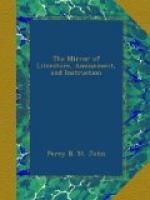In the kitchen of this farm-house is, or has been, a table of antique manufacture, upon which the identical Magna Charta was signed, and upon which the writer hereof has written and sealed many a letter, and partaken of many a glass of home-brewed ale, and bread and cheese equally homely—that is, genuine. This table is considered as an heir loom in the family of Mr. Gill, and if removed at all, has been removed to the manor-house.
It is an erroneous idea that Magna Charta was signed on Runnymede: it was signed on Magna Charta Island, which goes a great way to prove the identity of the table. If reference is made to the signing of treaties generally, as well in ancient as in modern times, it will appear that they have been signed at a distance from the scene of action; each party (particularly in feudal times) being attended by an equal number of adherents, to prevent surprise or stratagem.
The writer hereof has caught many a trout and perch off the banks opposite to the island, and has passed many a contemplative hour on the events of former ages, which have rendered the spot particularly interesting.
Gray’s Walk, Lambeth.
L.
*** If the writer is not mistaken, Magna Charta Island is an appurtenant to the manor of Wyrardisbury, and adjoins an estate called Ankerwicke, upon the grounds of which are the remains of an ancient monastery, or priory.
* * * *
THE WATER KING’S BRIDE.
FROM THE GERMAN OF SCHILLER.
(For the Mirror.)
Light o’er the water the sun’s
ray glanc’d,
While the youths and maidens of Tubingen
danc’d.
A stranger youth of noble mien,
Proffered his hand to the village queen.
“Youth, say why is thine hand so
white?
The water knows not the daybeams light;
Youth, oh why is so cold thine arm,
Can it in Neckar’s flood be warm?”
He led her away from the lime-tree’s
shade;
“Return my daughter,” her
mother said.
He led her on to the stream so clear,
“Oh youth let me go, for I tremble
with fear.”
He danc’d till they reach’d
the Neckar’s bank,
One shriek, one plunge, in the wave they
sank.
“Farewell, farewell, to thee, Tubingen’s
pride,
Maiden, thou art the Water King’s
Bride.”
H.
* * * * *
WOMAN.
(For the Mirror.)
The following curious compliment to the fair sex is extracted from an old play, entitled “Cupid’s Whirligig:”—




